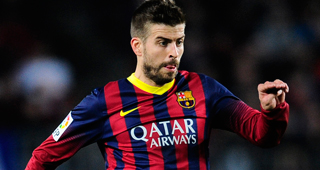The Barcelona-Real Madrid rivalry hit a deep valley in the spring of 2011, when José Mourinho, in his first season at the Bernabéu, gave up on outplaying Xavi and Messi and company and decided to see what would happen if he instructed Pepe and Xabi Alonso to knock the hell out of them instead. In four games—a Liga match, the Copa final, and two Champions League legs—played over eighteen days, the worst in everyone came out. Madrid walked onto the pitch with machetes and power tools tucked into their waistbands and Barcelona spent minutes-long spells writhing on the turf and pleading with the referee. These were probably the two best teams in the world at the time—though Barça were in their own category at that point—and they produced soccer that was about as much fun to watch as someone else’s marital spat.
In the aftermath of that cataclysm, there were concerns over whether the Spanish players involved could get over their mental-emotional injuries and play together for the national team. After all, Alonso, Sergio Busquets, and Xavi were midfield partners, Sergio Ramos and Gerard Piqué were Spain’s starting center backs. They had to at least tolerate each other during international breaks and tournaments. As it turns out, this worry wasn’t well-founded. Spain continued to play excellently, won the 2012 Euros, and murmurs about rifts within the side mostly went away. Their subsequent struggles haven’t been down to chemistry so much as turnover: the aging out of all-time greats and the bumpy integration of younger players like Koke, Thiago, and Alvaro Morata. Spain are whole, if no longer wholly dominant.
The only player who seems to have held onto his antipathy is Piqué. There’s a playfulness to most of it—two seasons ago, he tweaked Ronaldo for celebrating his birthday in a nightclub a few hours after Real Madrid got destroyed 4-0 by Atleti, and Piqué tweeted some crying-laughing emojis after Madrid were knocked out of last year’s Copa del Rey for fielding an ineligible player—but beneath the jokes there’s some genuine disdain. Madrid and Barcelona are currently engaged in a kind of proxy administrative war where they’re tattling on each other to various authorities. Barça believe Bernabéu forces are behind tax fraud cases against Neymar and Messi and Madrid think Barcelona ratted them out about illegally registering a few youth players, which got them banned from making any transfers this past January. Piqué’s take? I don’t like the values Real Madrid transmit, he said after Tuesday’s friendly against France. I don’t like… how those in the box seats pull the strings.
Piqué was quick to mention that he’s friends with Madrid players and hopes they don’t take his hatred for the club too personally. There’s no story here about intra-Spain squad strife for anyone except the most committed, kayfabe-masked daily columnists in Madrid and Barcelona. Piqué will go on catching a few boos around Spain—Real Madrid fandom isn’t restricted by the city limits—and it will continue to not be a big deal.
However, there is something to Piqué’s prickliness with regard to Barcelona’s eternal rivals. As Barça drift further toward corporatization, toward money-grubbing sponsorship deals and shady transfer shenanigans, they have begun to lose what made them special, or what they believe does anyway. That more than a club slogan is like a faded, artillery shell-tattered flag these days, but it’s still a meaningful sentiment, if you listen to it the right way, standing in for a certain Catalan exceptionalism and commitment to an aesthetic ideal, the notion that Barcelona try to keep their religion while also keeping up with Madrid and Bayern and Juventus. Whether they actually have—well, Luis Suárez wasn’t cheap, was he? But Piqué grew up in La Masia and was indoctrinated with its scripture. When he scoffs at whatever chicanery Florentino Pérez is up to, it’s more a recitation of dogma than insult. Though it is also that.
There isn’t much old school dogma left in modern soccer, at the highest levels. As their golden generation grays, Barcelona are considerably less Catalan than they were a decade ago, and, more broadly, talent moves as fluidly as it ever has, meaning players and managers don’t stick around at one club for long and squads don’t have fixed identities. This means more for some clubs than others. Real Madrid have always been big spenders, identifying the best players from elsewhere, plunking down an obscene sum of money, and handing them an all-white strip. Chelsea more or less detonated their history and became a completely new club when Roman Abramovich bought them.
Barcelona are more institutionally conflicted. They have something to hold onto. Of course, this won’t stop them advancing down the path they’ve been treading for a while. As much as Piqué might complain about Pérez, Barcelona brass aren’t beacons of virtue, and Qatari oil money helps pay his salary. Barça have become more like Real Madrid over the years because occupying the moral high ground doesn’t feel as good as winning titles. This is what Piqué is bristling against, when he periodically plants a couple jabs into Madrid’s ribs: Barcelona and Real Madrid as similar clubs with similar methods. He still thinks there’s a crucial distinction to be made. But that he’s compelled to point it out again and again demonstrates that it isn’t obvious to anyone outside the Nou Camp.



